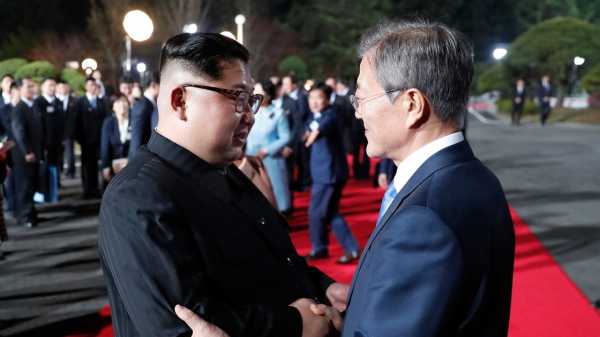
The recent images of Kim Jong Un and Moon Jae-in shaking hands made something in my chest calve and fall away, for I couldn’t help but think of my father. I suspect he would have broken down and cried, seeing the North and South Korean leaders embracing and welcoming each other to step over the border and amble on their respective sovereign lands. Even I, who have spent most all of my life as an American, found that the sight of the two men treating each other with the warmth of old friends, if not brothers, inspired a deep welling of hopefulness. Who would not want a lasting and possibly reunifying peace? Yet a colder part of me remains skeptical, when looking past the enactments of the highly staged ceremonies. Kim has reportedly stated his willingness to abandon nuclear weapons. But, when he and Moon get down to the hard calculus of nuclear disarmament and troop reductions or removals, will they be strolling arm-in-arm then? Will a comprehensive agreement neatly paper over the countless shocking human-rights abuses of Kim’s regime? Can a dictatorship and a democracy actually coexist?
Still, whether or not the summit will lead to a transformed Korean Peninsula, I wish that my father could have seen it. He was born a Northerner, in Pyongyang, in 1939. A few months into the war, in the fall of 1950, he and his family and relatives, along with millions of others, made their way southward as refugees. After the armistice, in 1953, they settled in a modest precinct of Seoul, where they began life again from scratch. My father did well in his studies, attended university and medical school, and, eventually, under the Immigration Act of 1965, immigrated to America with his own young family. He died two winters ago, in Paramus, New Jersey; that autumn of 1950 was the last time he stood on his natal ground.
I once heard my father recount the story of the family’s final chaotic moments at their house in Pyongyang. My father’s father had been a prosperous truck and motor-parts dealer, although by the time they fled the North’s Communist government had seized most all of his business and wealth. Each family member was tasked with gathering only what was vital. They would share a small truck with the family of my grandfather’s brother, and bear whatever else they could on their backs. They could hear artillery shells in the far distance. The front of the war had recently been pushed swiftly north by U.N. forces, nearly to the Yalu River, at the border to China. But, by October, it was veering back south, toward Seoul, driven by a massive Communist Chinese counteroffensive. Like many other Koreans in the North, my family recognized that if they wished to remain on the side of the U.N, fleeing to the South now might be their last chance.
My father, the third of seven children, was eleven years old then. My grandfather ordered him to run up the hill to where his uncle lived, to alert his family that it was nearly time to leave and that they should come down and join the rest of the clan. Earlier in the day, my father had been up there to lend a hand as his cousin, my grandfather’s niece, prepared to give birth to her first child. But now it was oddly quiet when he entered the inner courtyard of the house. The family was crowded in one of the small rooms, where my father’s cousin had begun her labor. Her husband was stricken, perhaps equally with joy and fear. Her mother, my father’s aunt, said that they couldn’t leave yet. They needed more time.
My father sprinted back to his own house and relayed the message. My grandfather said that they would wait. But by dusk the village was nearly emptied out, the thunderous booms of guns ever-nearing. My grandfather decided that they could delay no further, and sent my father back up to his brother’s house to tell them it was time to go. But when he got there his cousin was still in the throes of her labor; perhaps it was the extreme stress of the moment, or that it was her first childbirth, but she had not progressed very much. My father recounted to me how his uncle calmly told him that they would catch up with the rest of them after the baby was born. It would all work out. They would meet up soon.
That was the last time my father or anyone else they knew saw his uncle’s family again. In fleeing the North, my father’s own family suffered unbearable miseries. He lost two younger siblings during their journey, a sister to pneumonia and a brother to a train accident; he bled to death in my father’s arms. My father didn’t talk about that but once, and only when I pressed him. But over the years, when there were new developments in North-South relations, or when he saw Korean TV programs about long-separated relatives being reunited, my father might mention his uncle and aunt, his pregnant cousin and her husband and their baby, and wonder whether they had perished during the shelling, or else survived the war, living somewhere in the North, safe all these years. Kim and Moon’s recent talks would have surely made my father think of them again, and also of returning someday to Pyongyang, which he periodically spoke of doing. Of course, that was the most slender of hopes, and nothing more. But I know it was a hope he kept to the end.
Sourse: newyorker.com






